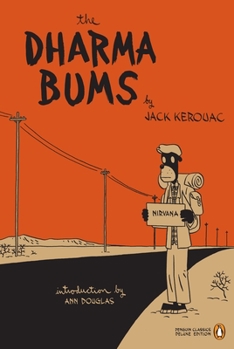The Dharma Bums: (Penguin Classics Deluxe Edition)
(Part of the Duluoz Legend Series)
Select Format
Select Condition 
Book Overview
Jack Kerouac's classic novel about friendship, the search for meaning, and the allure of nature--featuring an Introduction by Anne Douglas
"In On the Road] Kerouac's heroes were sensation seekers; now they are seekers after truth . . . the novel often attains a beautiful dignity."--Chicago Tribune
First published in 1958, a year after On the Road put the Beat Generation on the map, The Dharma...
Format:Paperback
Language:English
ISBN:0143039601
ISBN13:9780143039600
Release Date:October 2006
Publisher:Penguin Group
Length:224 Pages
Weight:0.61 lbs.
Dimensions:0.6" x 5.8" x 8.3"
Age Range:18 years and up
Grade Range:Postsecondary and higher
Customer Reviews
6 ratings
Highly recommend
Published by ChefRocco , 1 month ago
Kerouac is one of two American authors. To have written about America in a time of peace. Dharma Bums is the last narrative written on the romantisim of the hobo. It vanished from our lore and culture in America. Around the last turn of the century.
dharma bums changed me forveer
Published by junokezu , 6 months ago
everything he said was bomb asf
Kerouac's best novel
Published by Thriftbooks.com User , 16 years ago
If you're new to Jack Kerouac, this might be the place to start. Many people's first introduction to Kerouac is On The Road. While I love On The Road, I've read pretty much all of Kerouac's novels, and I have to say that The Dharma Bums is my favorite. Indeed, I loved the book enough to write a companion reader for it (The Beat Handbook: 100 Days of Kerouactions), so right up front I have a bias and thought you should know about that. In at least one of his letters (Jack Kerouac: Selected Letters: Volume 2), Kerouac himself acknowledged that The Dharma Bums was 'really bettern ON THE ROAD' (p. 99). So, if you don't take my word for it, maybe you will take the author's and make this your first foray into beat literature. I don't think you'll regret it.
The Dharma Bums
Published by Thriftbooks.com User , 17 years ago
Following the success of "On the Road", Kerouac's publishers initially rejected his manuscripts such as "The Subterraneans" and "Tristessa." But his publisher asked him to write an accessible, popular novel continuing with the themes of "On the Road." Kerouac responded with "The Dharma Bums" which was published late in 1958. "The Dharma Bums" is more conventionally written that most of Kerouac's other books, with short, generally clear sentences and a story line that is optimistic on the whole. The book was critiqued by Allen Ginsberg and others close to Kerouac as a "travelogue" and as over-sentimentalized. But with the exception of "On the Road", "The Dharma Bums" remains Kerouac's most widely read work. I had the opportunity to reread "The Dharma Bums" and came away from the book deeply moved. As are all of Kerouac's novels, "The Dharma Bums" is autobiographical. It is based upon Kerouac's life between 1956--1957 -- before "On the Road" appeared and made Kerouac famous. The book focuses upon the relationship between Kerouac, who in the book is called Ray Smith and his friend, the poet Gary Snyder, called Japhy Ryder, ten years Kerouac's junior. Kerouac died in 1969, while Snyder is still alive and a highly regarded poet. Allen Ginsberg (Alvah Goldbrook) and Neal Cassady (Cody Pomeray), among others, also are characters in the book. Most of the book is set in San Francisco and its environs, but there are scenes of Kerouac's restless and extensive travelling by hitchiking, walking, jumping freight trains, and taking buses, as he visits Mexico, and his mother's home in Rocky Mount, North Carolina during the course of the book. The strenght of "The Dharma Bums" lies in its scenes of spiritual seriousness and meditation. During the period described in the book, Kerouac had become greatly interested in Buddhism. He describes himself as a "bhikku" -- a Buddhist monk -- and had been celibate for a year when the book begins. I have been studying Buddhism myself for many years, and it is easy to underestimate Kerouac's understanding of Buddhism. As with many authors, he was wiser in his writing that he was in his life. There is a sense of the sadness and changeable character of existence and of the value of compassion for all beings that comes through eloquently in "The Dharma Bums." Smith and Ryder have many discussions about Buddhism -- at various levels of seriousness -- during the course of the novel. Ryder tends to use Buddhism to be critical of and alienated from American society and its excessive materialism and devotion to frivolity such as television. Smith has the broader vision and sees compassion and understanding as a necessary part of the lives of everyone. Smith tends to be more meditative and quiet in his Buddhist practice -- he spends a great deal of time in the book sitting and "doing nothing" while Ryder is generally active and on the go, hiking, chopping wood, studying, or womanizing. At the end of the book, he leav
Poor Gentle Flesh, There's No Answer.
Published by Thriftbooks.com User , 18 years ago
"On the Road" may be considered the classic Kerouac novel, the archetype of Beatnik prose, but I would recommend "Dharma Bums" over "On the Road," as the best Kerouac read and the most important of Kerouac's works. I would even recommend "Dharma Bums" over the Kerouac Reader or other beat anthologies. I'm always the first to admit that my perceptions of books are colored by the context of my life when I read it. I first read "Dharma Bums" when I was in college in Boulder, Colorado, I was an apathetic academic but had a budding interest in Buddhism and was sitting in for sunrise meditation with a Zen group at a Buddhist temple. I didn't own a car, rode my bike everywhere, hiked, rock climbed, and indulged in other beat-like habits. Still, I think I started all of Kerouac's books somewhere along the line, some multiple times, and "Dharma Bums" was the only one I finished. Having just now reread it, it continues to stand apart from his other works. Kerouac's writing is always interesting to me but it is hard to move forward sometimes without a story arch. When reading Big Sur, for example, in which he writes as elegantly as possible about descending into the madness of alcohol psychosis, I find it hard to maintain my momentum. "Dharma Bums" represents a time, a naive time in retrospect perhaps, but a fun exciting time when the beats were young, full of energy and enthusiasm, and really believed they were on to something cosmic. Over the course of this book we see Kerouac's Buddhism deepen. In fact, more than deepen, it matured and softened, evolving from austere and ascetic into something much more philosophical. More Zen, less dogmatic, not necessarily in conflict with indulgence and gratification. And things are happening in the book, there are elements of plot in the narrators travels and adventures. They climb a mountain as a spiritual practice, and, after struggling with paralyzing fear, Kerouac learns the great lesson "you can't fall off a mountain." There is the suicide of Rosie, a manic psychotic he was entrusted to baby-sit. There is various other traveling, hitchhiking, and meditating adventures, and the book wraps up with enchanting nature prose, written during solitary days as a wilderness fire lookout. I had to check this out of the library to reread it, (see my listmania, "Books I wish weren't packed away at my in-laws"). My interest in Zen was sparked by this book initially and re-reading it drove me right back to the mat.
Life is great!
Published by Thriftbooks.com User , 24 years ago
Having heard me praise this book countless times, my wife finally read it for herself. Her response? "You know, I was expecting some stereotype of `cool' Beatniks, trying to be so hip and detached. But that's just some popular media image. The people in this book are exuberant, thoughtful, even spiritual!" That sums it up as well as anything. Forget the glib idea of alterna-cultural one-upmanship that passes for a Beat attitude these days - "The Dharma Bums" is about naïve exuberance, anything-but-ironic soul-searching, an eager exploration of life's sorrows and joys, and the sheer, exhilarating, wondrous zest of being alive and aware in an endlessly fresh world. If reading this clear mountain stream of a book doesn't make you want to change your life and your way of looking at life, then you're just hopelessly blind to something precious! Life is so much more than the neatly packaged, pre-imagined commercial that society would love to sell you, and "The Dharma Bums" will gladly show you one possible way of finding your true path.
The Dharma Bums Mentions in Our Blog

The Literary Wisdom of Ted Lasso
Published by Ashly Moore Sheldon • October 28, 2021
There are many reasons to love the Apple+ show, Ted Lasso. And one of the most compelling of these (for us anyway) is all the books that show up in it! Ted and his loyal sidekick Coach Beard are clearly big readers and the literary figures prominently in their chatter. So while we wait for season three, we are exploring the Ted Lasso library.






